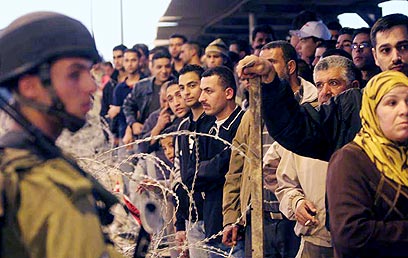
Esti Tsal wants everyone to know what goes on at West Bank checkpoints
Don't say you didn't know
Few Israelis know what goes on at West Bank
Twice a day, every day small groups of women (up to five members) set out for checkpoints around the West Bank, from Jenin in the north, to Hebron in the south. Some go once a week, others once a fortnight.
Some of us are young, others older, some very old. We stand vigil at the checkpoint for several hours, observe and record everything we see and hear.
At the end of each vigil we write a detailed report, in Hebrew and English, of everything we've seen and heard, and post it on our website. Many of us also carry cameras, and our annual reports and other publications are distributed to government bodies, Knesset members, legal and security officials, and local and foreign media.

West Bank roadblock (Photo: AP)
Why do we do it? First and foremost, to know more than we're being told.
We do it to see for ourselves, so that we can't say we didn't know. We do it to protest, to tell others the whole story, including the things most people do not want to know.
Asking questions
Machsom Watch is a voluntary organization of field activists opposed to the occupation in the West Bank. Our aim is to make Israeli society aware of the daily humiliation, the hopelessness, the hardships and the suffering that are a routine part of life in the occupied territories.
We want to highlight the violence, the moral deterioration, the lack of free movement, the persecution and violation of the Palestinians' most fundamental human rights. The group was founded in February, 2001.
We are there to ask, what on earth are we doing here? From whom are the soldiers actually protecting us? And who are they defending? What are we wasting such vast resources on? Who do all those red-roofed houses belong to that we see out of the car window? For whom are these neighborhoods being built?
For whom are so many roads and tunnels being built? Why are there so many soldiers and roadblocks on the way there? What are bulldozers doing crunching up the divine landscape, using their fangs to turn a blooming olive grove into yet another paved road?
This is what we see on our way to the checkpoints. In the car we hold many discussions, and we have many disagreements. But we all agree about one thing: Occupation corrupts, it is immoral, and we are trying to put an end to it.

Grim reality (Photo: Gil Yohanan)
I joined the organization four years ago. A friend told me about it, said I had no idea what was going on just a half-hour from Tel Aviv, and invited me to join her.
I accepted not knowing what to expect, and was a bit apprehensive. Is it dangerous? Not dangerous? I thought I knew. Like everyone else, I read the newspaper, I follow "what's happening." I listen to the stories of the kids who serve there as soldiers, I see the photos on TV. I tell myself it's all so horrible, but life does go on.
But nothing prepared me for the sight of 200 people standing in line at the border between Israeli Taibe and Palestinian Tul Karem, most of them young men, looking at the ground, patiently waiting for the soldier's finger to gesture and indicate they should step up, one-by-one.
It was late in the afternoon, people were returning home from work in Israel after an exhausting work day.
Just another day
What did I see that day? Nothing extraordinary. No violence, no brute force. Just people standing in line, submissive, obedient, matter of fact.
I'll never forget this sight. I kept imagining myself and my family standing like this day after day, begging the soldiers to speed up the line.
I also saw many cars with their yellow (Israeli) license plates speed freely by the checkpoint. I was quite amazed. I still didn't know who was who. Many of them looked orthodox.
I couldn't fall asleep that night, nor could I explain to the people close to me what was wrong. The car in which we had driven that day had been stolen, an unpleasant experience that added to our frustration.
But that incident has nearly been forgotten. The sight of people standing in line, entirely at the mercy of soldiers, would not go away.
Since then I've been overwhelmed by a strong need to see, a thirst to know more.
I realized that up to then my vision had been fuzzy. Now I see sharp and clear. The sight is anything but simple. It's cruel.
Five minutes difference
Just five minutes from Kfar Saba, and you're in another world. Neglected, tense, unstable. Lawless. There is a different sort of body language between dominator and dominated.
And most people don't know that most of the checkpoints separate communities deep inside Palestinian territory. Try to imagine a checkpoint between Ramat Gan and Givatayim: You get up in the morning to go to work, to the doctor, to university, to take your kid to kindergarten. Should be routine.
But you find the road blocked, and some armed soldiers demand your ID. Same thing on the way home. Why? Because maybe, just maybe, another person will cross with you who has especially ill intentions.
Is that your fault? Absolutely not. But here everyone is guilty until proven innocent. And even if you manage to cross this hurdle, there's no assurance that in another kilometer or two, you won't run into yet another roadblock. There, too, there will be a line, and you'll have to wait for the finger gesture that orders you to advance.
Your ID got you through the last checkpoint? Not here. It's no good here; now you are under arrest. And when your ID is taken, you just have to wait until… until God knows when. Until someone says "yes."
And what's the explanation for all this? What does the army say? Security. Security.
Collective punishment
What's it like? Imagine a serial rapist wandering the streets of Tel Aviv and suspecting the entire population. Everyone is checked at the city's entry and exit points and at every major intersection, until the rapist is caught.
Sound reasonable? Of course not. But here in the Territories it is the norm. Hours and hours standing in line, often times well into the night. The family can wait. Everyone knows you're probably stuck at the checkpoint.
Now try to explain this endless restraint of all those standing in line. Their determination, in spite of all the odds, not to give up one day of school, one day of work, even if this means standing in line all day.
Few people are aware of what goes on behind the scenes at the checkpoints. No one is familiar with the suffocating bureaucracy of this movement-checking system, the torment that goes with attempts to obtain a permit to move around, the endless harassment of Palestinian lives.
Right now, in front of our very eyes, the landscape is undergoing change, and so do the checkpoints. More turnstiles, more electronics, more and more control.
Border checkpoints have taken on a new look, painted in soothing pastel colors. They have also been renamed "crossings." No, no, no, this isn't a checkpoint. It's a border crossing, a terminal.
This sounds great, but from the Palestinians we hear of greater distress and an even greater sense of imprisonment. More and more control, less and less freedom of movement.
Forgetting humanity
The cage becomes more sophisticated. Inhuman. Thousands of people are moved around like cattle, crowded from one turnstile to the next, always under surveillance of the control room.
The army is very proud of its latest technological progress, but on the way they have forgotten to stay human. Overhead, soldiers patrol, guns pointed, on the ready for any eventuality.
The new "crossings" are immeasurably crueler than the previous kind. Every step is checked. You exit your home and run into a wall. You want to go to the next village but are not allowed to use the road that you traveled on yesterday.
Even walking is no longer simple. An army jeep can show up out of nowhere, with two soldiers who demand your ID.
You cannot really plan your day, someone almost always has other plans for you.
We used to see life-texture. People moving around – children, old people, women. People.
Empty landscape
Now the landscape is nearly devoid of people. Where is everyone? The apartheid roads are nearly empty. Hundreds of kilometers without any movement but for the army and various security forces, and the settlers who drive around unhampered.
We used to see carts on the roads, donkeys pulling loaded wagons, and people walking along with them for miles on foot because vehicular traffic is forbidden. Now not even this.
We used to see many children around the checkpoints, at junctions, on the roads. Now not even them. Where is everyone? Where has this entire population been pushed?
Through our efforts we discover unimaginable rules and regulations. Many Knesset laws are enforced in the territories with unexplained zeal?
For example, the Preservation of Nature Law forbids picking wild thyme or sage even if it grows in your own yard. Violation carries a NIS 600 (USD 145) fine. I've seen it with my own eyes.
If a regional commander wakes up one morning and decides that today everyone hops on one foot – so be it. No need for a Knesset vote on the issue, and anyone walking on two feet is liable to get his ID confiscated find himself under arrest.
Sounds surreal, but the fable is not that far-fetched. The checkpoints are run arbitrarily. No logic. There are no rules and procedures can be changed instantaneously. What was forbidden a moment ago might suddenly be permitted. Why? Because.
Our photo exhibition Endless Checkpoints is currently being featured at the School of Geographic Photography, in honor of MachsomWatch's fifth anniversary.
The exhibit contains photo documentation of the things we have seen and experienced. We hope it will cast some light on life in the invisible zone, and make the Israeli public aware of the Palestinians` unbearable daily lives










